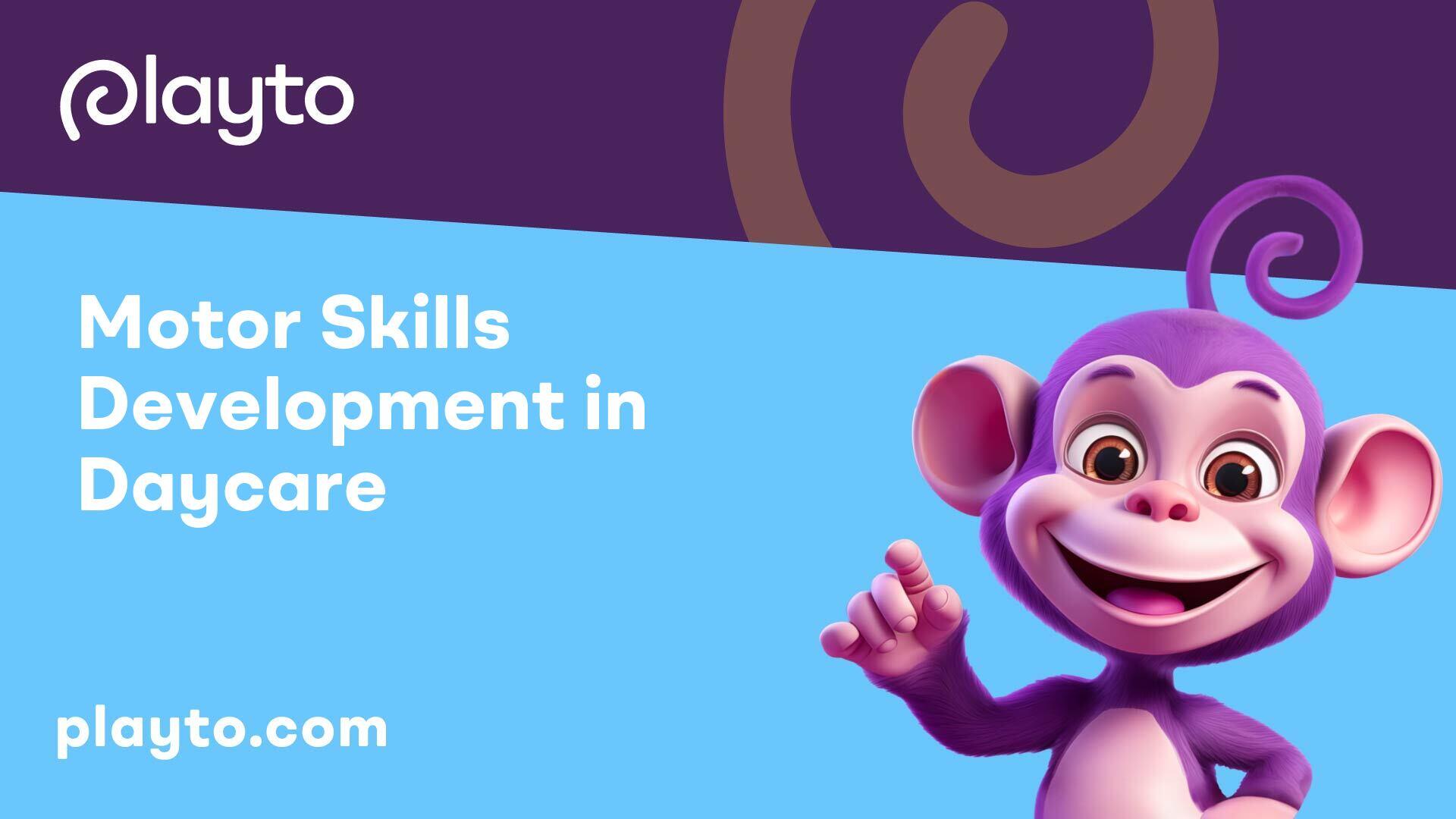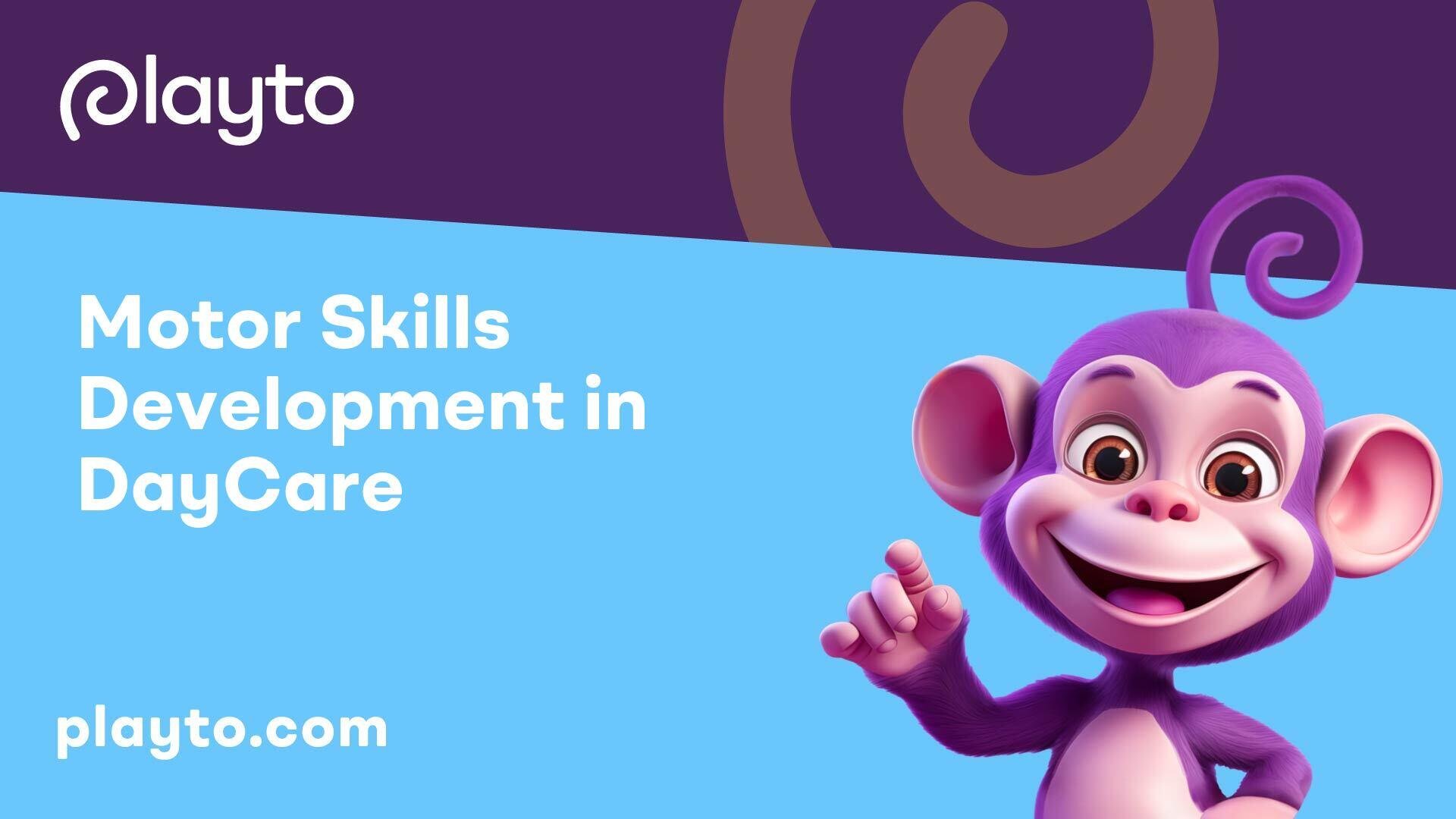
Motor Skills Development in Daycare
When considering the development of motor skills in daycare settings, a key aspect to focus on is the importance and progression of gross motor skills. Gross motor skills are vital abilities needed to control the muscles of the body for large movements such as crawling, walking, jumping, running, climbing, skipping, and throwing and catching a ball. These skills are fundamental for the overall development of babies, toddlers, and children.
Importance of Gross Motor Skills
Gross motor skills form the foundation for a child's physical development journey. Babies typically learn gross motor skills from head to toe, with upper-body muscle control developing before lower-body muscle control. They progress from controlling their neck and trunk to mastering their shoulders, elbows, wrists, and eventually fingers. Similarly, in the lower body, the development starts at the hips and extends to the legs, feet, and toes.
The development of gross motor skills precedes that of fine motor skills. While gross motor skills involve large muscle groups like arms, legs, and trunk, fine motor skills involve the small muscles of the body, particularly those related to finger and hand movements. Therefore, nurturing gross motor skills is crucial for laying a strong physical foundation for children to further develop their finer motor abilities.
Progression of Gross Motor Skills
In cases where a child's gross motor development is delayed, pediatric physical therapy may be recommended to assist them in gaining these skills. Through physical therapy, a focus on foundational skills can help maximize the child's potential for gross motor development. This targeted approach aids in addressing specific needs and challenges, enabling children to progress and build essential motor skills effectively [1].
The progression of gross motor skills is not only important for physical activities like walking, running, throwing, lifting, and kicking, but it also serves as the cornerstone for the development of fine motor skills. Additionally, the enhancement of gross motor skills contributes significantly to body awareness, reaction speed, balance, and overall strength [2].
Understanding the significance and progression of gross motor skills in daycare environments plays a pivotal role in providing children with the necessary support and opportunities to develop these foundational physical abilities effectively.

Encouraging Gross Motor Skills
When it comes to child development, fostering motor skills is a crucial aspect of a child's growth and learning process. Gross motor skills are fundamental abilities that involve controlling the large muscles of the body to perform activities such as crawling, walking, jumping, and running. It's essential to understand the significance of gross motor skills development and the interventions available for children with delayed progress.
Benefits of Gross Motor Skill Development
Encouraging the development of gross motor skills in children offers a wide array of benefits beyond physical health. As children engage in activities that promote gross motor skills, they not only enhance their physical strength and coordination but also boost their self-esteem and confidence. The ability to participate in physical activities with ease contributes to a child's overall well-being and social interactions.
Furthermore, strong gross motor skills lay the foundation for more complex physical tasks and sports activities as children grow older. By mastering activities like throwing, catching, and balancing, children improve their motor coordination and spatial awareness, preparing them for a variety of recreational and educational pursuits.
Physical Therapy for Delayed Development
In cases where a child's gross motor development is delayed, seeking guidance from pediatric physical therapists can be instrumental in addressing any underlying issues. Physical therapy tailored to the individual needs of the child can help promote the development of gross motor skills and address any specific challenges they may be facing.
Pediatric physical therapists are trained to assess and create personalized intervention plans to target areas of weakness and enhance motor skill acquisition. Through a combination of therapeutic exercises, activities, and interventions, physical therapists work collaboratively with parents and caregivers to support the child's motor development journey.
By identifying and addressing delays in gross motor skill development early on, children can receive the necessary support to progress and succeed in their physical abilities. Implementing a comprehensive approach that combines play-based activities with targeted interventions can help children reach their full potential and thrive in their motor skill development.

Enhancing Motor Skills through Play
In the realm of early childhood development, play serves as a significant tool for enhancing motor skills. Engaging in goal-oriented play activities and active play can have a profound impact on the physical development of children.
Goal-Oriented Play Activities
Goal-oriented play activities play a vital role in developing motor skills in children, as emphasized in a study conducted with participants aged 4.5–6 years old over a span of 12 weeks. These activities involve tasks such as running, walking on a balance beam, moving sticks, throwing and catching a ball, and arranging blocks. The structured nature of these activities aims to enhance motor skills, including speed, agility, balance, coordination, and strength.
One key takeaway from the study is the significant improvement in motor skills observed post-training, indicating the efficacy of goal-oriented play in fostering physical development. Introducing children to such purposeful play sessions can lead to noticeable enhancements in their overall motor abilities.
Impact of Active Play
Active play, especially when focused on goal-oriented activities that involve repetitive muscle movements, demonstrates a positive impact on muscle function and development [3]. Through activities like walking on a balance beam, moving sticks, jumping goalposts, throwing balls, and arranging blocks, children engage in movements that enhance their muscle strength, speed, agility, and balance.
The activation of muscles during active play not only strengthens physical capabilities but also promotes improved blood circulation to the brain. This increased blood flow aids in cognitive development and overall well-being. The study highlighted the significance of active play in encouraging children to repetitively engage in muscle-strengthening movements, ultimately leading to substantial improvements in their motor skills.
By integrating goal-oriented play activities and fostering an environment that encourages active play, caregivers and educators can support the motor skill development of children in daycare settings effectively. Harnessing the power of purposeful play and physical engagement lays a solid foundation for the holistic growth and development of young learners.
Motor Skill Development in Early Childhood
Understanding the significance of motor skills development in early childhood is crucial for overall child development. Optimal stimulation of motor abilities, particularly between ages 4–6, plays a vital role in contributing to various aspects of physical and mental health as well as cognitive achievement. Motor skills involve the control of movement performance by the nervous system, impacting children's overall well-being.
Overall Impact on Development
Motor skill development in early childhood has a profound impact on children's physical, social, cognitive, and psychological development. It enhances fitness levels, bone health, reduces body fat, and improves the quality of life. With regular muscle activity through play, children can enhance muscle strength, speed, balance, and coordination, aiding them in daily tasks and activities.
To promote motor skill development effectively, incorporating various play activities that engage gross motor and fine motor skills is essential. These activities not only encourage physical movement but also support children's overall growth and well-being.
Effective Play Activities
When considering effective play activities for motor skill development, it's crucial to engage children in goal-oriented play that encourages the use of both gross and fine motor skills. Activities that involve running, jumping, climbing, and balancing help enhance gross motor skills while fostering physical strength, balance, and coordination.
To improve fine motor skills, activities focusing on intricate coordination and control of small muscles, primarily in the hands, fingers, and wrists, are beneficial. These activities aid in performing precise tasks that contribute to daily life and academic activities (Cheers Child Care), enhancing children's independence and capabilities.
By incorporating a variety of play activities that target both gross and fine motor skills, caregivers and educators can support children's holistic development and lay a strong foundation for their future physical abilities and overall well-being.
Fine Motor Skills Activities
In the realm of child development, nurturing fine motor skills is crucial for fostering independence in various daily activities such as dressing, feeding, and school performance. By integrating fine motor activities into a child's routine, parents can support their child's occupational therapy journey effectively.
Importance of Fine Motor Skills
Fine motor skills play a pivotal role in a child's development by enhancing their ability to perform intricate tasks that require hand-eye coordination and dexterity. These skills are vital for tasks like writing, using utensils, buttoning clothes, and more. Developing fine motor skills early on can contribute to a child's overall independence and success in various activities.
Fine Motor Activities for Children
Engaging children in simple yet effective fine motor activities can significantly boost their motor coordination and independence. Activities like peeling stickers, stringing Cheerios, or placing coins in a piggy bank are not only entertaining but also aid in honing fine motor skills for toddlers and preschoolers.
Here are some suggested fine motor activities that can be fun and educational for children:
ActivityDescriptionPeeling and Placing StickersEnhances finger dexterity and precision.Stringing CheeriosDevelops hand-eye coordination and motor skills.Ripping or Crumpling PaperStrengthens hand muscles and improves grip.Placing Coins in a Piggy BankEnhances finger dexterity and coordination.Attaching Clothespins to Board BooksImproves fine motor skills and finger strength.
By incorporating these activities into a child's regular routine, parents can effectively contribute to their child's fine motor development and support their journey towards enhanced independence.
Fine Motor Precision Skills
Fine motor precision involves the hand’s ability to execute efficient and targeted movements with specific goals in mind. Engaging in activities such as mazes, Perler beads, or puzzles can help children refine their fine motor precision skills and master intricate tasks that require accuracy and coordination.
Fine Motor Strength Activities
Building adequate strength in the hand is essential for functional tasks and overall fine motor development. Activities like using syringes for art projects, picking up items with tweezers, or engaging in origami can help children develop the necessary hand strength required for various daily activities.
To further enhance a child's therapy program and promote fine motor development, integrating engaging and interactive fine motor activities into their daily routine is essential. These activities not only facilitate skill development but also provide a fun and engaging way for children to improve their motor skills.
Supporting Fine Motor Development
Fine motor skills are crucial for children as they involve the intricate coordination and control of small muscles, predominantly in the hands, fingers, and wrists. In daycare settings, focusing on fine motor precision skills and engaging in fine motor strength activities can greatly benefit a child's overall development.
Fine Motor Precision Skills
Fine motor precision skills refer to the hand's ability to coordinate efficient and targeted movements with a specific goal in mind. Activities that foster fine motor precision include:
These activities help children refine their dexterity and hand-eye coordination, setting the foundation for tasks that require attention to detail and accuracy. To learn more about fine motor activities that enhance precision skills, consider our article on fine motor activities.
Fine Motor Strength Activities
Fine motor strength activities play a crucial role in developing the necessary hand strength for functional tasks. Some effective activities to improve fine motor strength include:
By engaging in these activities, children can strengthen the muscles in their hands and fingers, enhancing their ability to perform a range of everyday tasks with ease. To explore more fine motor activities focused on strength development, check out our detailed guide on fine motor strength activities.
Incorporating a variety of fun and engaging fine motor activities into a child's daily routine can significantly contribute to their therapy program and overall fine motor development. These activities not only promote the enhancement of fine motor skills but also offer children enjoyable ways to improve their motor skills while fostering independence and creativity.
For toddlers and preschoolers, activities such as peeling and placing stickers, stringing Cheerios, and attaching clothespins to board books can aid in the development of fine motor skills. These activities support children in gaining independence and improving their motor coordination, setting a strong foundation for their future academic and daily life tasks.
Early Childhood Motor Skill Training
When it comes to fostering motor skill development in early childhood within the setting of a daycare, goal-oriented play emerges as a pivotal strategy. This form of play involves engaging children in activities that are designed to improve specific motor skills, leading to significant enhancements in their overall motor capabilities.
Benefits of Goal-Oriented Play
Engaging children in goal-oriented play activities within the daycare setting offers a multitude of benefits. Studies, such as the one conducted by NCBI, reveal that goal-oriented play involving activities like walking on a balance beam, moving sticks, jumping goalposts, throwing balls, and arranging blocks can yield substantial improvements in motor skills. Through structured and intentional play sessions, children can enhance their speed, agility, balance, coordination, and strength.
Goal-oriented play not only promotes physical well-being but also nurtures cognitive development by stimulating problem-solving skills and spatial awareness. By providing children with clear objectives and challenges, goal-oriented play fosters a sense of accomplishment and self-confidence as they achieve milestones and overcome obstacles.
Improvement in Motor Skills
The implementation of a goal-oriented play activity program over a specified period, as demonstrated in studies like the one cited by NCBI, can lead to notable enhancements in motor skills among children aged 4.5-6 years. Consistent participation in activities such as running, walking on a balance beam, moving sticks, throwing and catching the ball, and arranging blocks can have a transformative impact on their physical abilities.
The structured nature of goal-oriented play ensures that children engage in repetitive muscle movements that target specific motor functions. This targeted approach not only strengthens their muscles but also enhances their coordination, dexterity, and spatial awareness. The consistent activation of muscles during play promotes increased blood flow to the brain, fostering cognitive development alongside physical growth.
By embracing goal-oriented play as a fundamental component of early childhood motor skill training, daycare facilities can create enriching environments that support holistic development. Through purposeful play activities that challenge and motivate children, daycare educators can empower young learners to reach their full potential and lay a foundation for lifelong physical well-being and cognitive prowess.
Promoting Physical Development
Encouraging physical development in young children is crucial for their overall well-being and growth. By incorporating age-appropriate physical activities and limiting screen time, caregivers can play a significant role in supporting children's motor skills development.
Age-Appropriate Physical Activities
For preschoolers, engaging in active play for 90 to 120 minutes per eight-hour day is recommended. This active play should involve a variety of activities such as drawing, completing puzzles, building structures, enjoying music and movement, dancing, jumping, climbing, swinging, skipping, and throwing balls. These activities help enhance both gross and fine motor skills, fostering physical strength, coordination, and flexibility in young children.
School-age children, on the other hand, should aim to be physically active for at least 60 minutes each day. This physical activity should encompass a mix of games with rules, running, climbing, drawing, writing, and using different types of sports equipment [6]. Incorporating a combination of aerobic activities, muscle-strengthening exercises, and bone-strengthening activities into their daily routine can contribute to their overall physical health and well-being.
Limiting Screen Time and Recommended Activities
The Centers for Disease Control and Prevention (CDC) recommend limiting screen and media time for children aged 6 to 17 years old due to concerns about inactivity. Less than one-quarter of children in this age group engage in the recommended 60 minutes of physical activity daily. Excessive screen time has been linked to sedentary behavior and the rise in childhood obesity rates over the years. As of 2015-2016, nearly 1 in 5 school-age children and young people aged 6 to 19 in the United States are affected by obesity [6].
For infants and toddlers, family child care providers are advised to limit the time spent in restrictive devices such as swings, bouncers, or play centers to 15 minutes or less. It's important to encourage infants and toddlers to learn through movement and exploration of their surroundings safely.
Incorporating structured and unstructured play into a child's routine can help maintain an active lifestyle and promote physical well-being. By providing a balance of physical activities, age-appropriate exercises, and monitored screen time, caregivers can contribute to the healthy development of motor skills in children.
Remember, creating a supportive environment that encourages physical play and limits sedentary behaviors is key to promoting physical development and overall health in children.
References
[2]:
[3]:
[4]:
[5]:
[6]:
